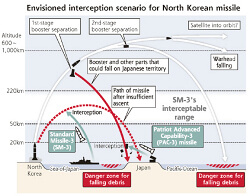温度差
The Yomiuri reports that an amendment to the FY 2010 defense budget may scotch existing plans to relocate our Futenma base on Okinawa:
A key U.S. congressional committee has added an amendment to the fiscal 2010 defense budget that would make it hard to realize an agreement reached by the Japanese and U.S. governments over the relocation of the U.S. Marine Corps’ Futenma Air Station in Ginowan, Okinawa Prefecture.
Japan and the United States have already agreed the facility will be relocated to the shoreline off Camp Schwab in Nago, in the prefecture.
The amendment says the U.S. defense secretary should not give its approval to the alternative facility as long as it fails to comply with minimum flight safety requirements.
The office of Rep. Neil Abercrombie, D-Hawaii, who proposed the amendment, told The Yomiuri Shimbun that the alternative facility under the current plan contravenes safety standards on the following points:
— The runways are too short.
— A school, Okinawa National College of Technology, is located nearby.
— There are obstacles, such as utility poles, along the flight path.
As a result, Abercrombie has stated that Camp Schwab is not an appropriate candidate for the alternative facility and that a new transfer location should be sought.
A Japanese government source said, “The content of this amendment suggests the transfer to the alternative facility agreed by Japan and the United States won’t be permitted.”
The relocation of the base has been a sticking point for years.
*******
There’s been an ongoing story about 7-Eleven Japan and one of the downsides to its now-legendary distribution system for prepared food, and the Mainichi has a pretty comprehensive piece on its English site:
Seven-Eleven Japan Co. announced Tuesday that the company would help cover the costs of unsold food currently borne entirely by individual convenience stores, but franchises said the move was not enough.
The industry giant’s headquarters will cover 15 percent of the cost of unsold items such as sandwiches and bento boxed lunches at franchise stores beginning in July. The company is the first major convenience store chain to take on part of such costs.
“Franchises are worried about wasting food, but also that if they don’t order enough, they will run out of stock, causing trouble for their customers and hurting business,” said Seven-Eleven Japan President Ryuichi Isaka at a news conference Tuesday.
In the wake of the Seven-Eleven announcement, it appears possible the practice will spread to the entire industry, where shifting losses, and the responsibility for the disposal of large amounts of food, onto franchises is common. Perhaps the era of forcing major expenses onto franchises while the corporate headquarters racks up profits is nearing an end. However, as central support for franchises increases, differences in corporate strength between convenience store companies will likely widen.
…
In a standard franchise contract, judgment regarding orders of food items such as boxed lunches is left up to franchise owners and they also bear the total burden of losses from unsold items. However, stores that reduce orders run the risk of regularly selling out and leaving their shelves empty, dealing a blow to the business model convenience stores are based on.
One way to move unsold stock is to reduce prices, but Seven-Eleven Japan had a policy against discounting. However, the company was ordered to eliminate that policy Monday by the Japan Fair Trade Commission, which could spur Seven-Eleven franchises to begin reducing food item prices to avoid having leftovers and the losses they entail.
Like a lot of people in Tokyo, I worked within a five-minute walk of a good half-dozen convenience stores, and many of the 7-Eleven prepared-food offerings were, at least at first, markedly better than what you got from its competitors. (The nearby am-pm was horrible when I first started at my old company, though it cleaned up a lot, both literally and figuratively, several years ago.) They weren’t home or restaurant quality, but they were pretty much as good as train-station bento. There was a great deal written about 7-Eleven Japan some years ago during its ascendancy, largely because it was one of the few enterprises wowing Westerners after the fashion of the old Japan, Inc., era. But of course, you can’t predict inventory turnover perfectly, especially for something as whim-dependent as what people feel like eating for lunch once they pull up to the refrigerator case and have to pick something.
*******
The Nikkei says that China is agreeing in principle to uphold the draft UNSC resolution on North Korea:
On 24 [June], the Chinese government opened individual meetings in Beijing with both U.S. and Japanese governments, and they were in accord on adopting the direction of upholding the sanction on the United Nations Security Council against North Korea, which had pushed brazenly forward with a second round of nuclear testing. It took the position of non-recognition of North Korea’s possession of nuclear capability and of applying concerted pressure, but it also stressed the importance of dialogue. On pulling together for cargo inspections of vessels entering or leaving North Korea, China is still cooler than Japan, the U.S., and South Korea; and it left unclear how far it would go along the path of “pressure.”
